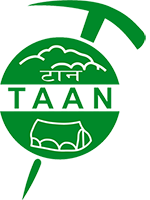
When is the best time to trek Manaslu?

When is the best time to trek Manaslu?
swotah travel
3224
03, 09 2024
The prime time for a Manaslu circuit trek is during spring and autumn, as they present better trekking features and milder climates. It is doable during winter and monsoon season, but you might face harsh environments and icy weather.
Moreover, the Himalayas are infamous for their unpredictable climate, which changes in a heartbeat. Nonetheless, trekking in Manaslu in various seasons has its own set of pros and cons.
About Manaslu Circuit Trekking
The eighth-highest mountain in the world, Manaslu, lies at 8,163 meters above sea level. The Sanskrit phrase manasa, which means “intelligence” or “soul,” is the source of the name Manaslu, which translates to “mountain of the spirit.”
The Manaslu trip is stunning, and anyone who completes it will always have it as a memorable experience. The circular walk around the Manaslu features remote and untouched barren lands, breathtaking views of Manaslu, unique countryside villages, alpine and subalpine habitats, including dazzling rhododendron forests.
Manaslu Trek in Spring
The spring is a wonderful time of year to hike the Manaslu circuit. March, April, and May are the months that make up the spring season. The road is somewhat secure, the temperature stabilizes, the rivers fill and produce amazing rapids.
Moreover, flowers flourish, birds sing and get ready for the mating season, and the environment becomes welcoming.
Although clouds may occasionally form at low elevations, spring also brings crisper skies and nicer views. The volume of humans increases as well but since the trek is yet to be discovered by a lot, it’s not too crowded.
Additionally, now is the ideal time to see the rhododendron blooming in the mountainous area.
The national flower of Nepal, the rhododendron, blooms to the fullest, and the view is truly mesmerizing. Therefore, the optimum time to complete the Manaslu Circuit Trek is spring.

Photo: Majestic springtime views on the Manaslu Circuit Trail.
Manaslu Trek in March
March’s Manaslu Circuit Trek provides ideal trekking weather and a consistent climate. The rich biodiversity and ample number of flora and fauna will assist you throughout the path. Early March is the ideal time to go hiking since the flowers start to blossom, the weather is nice, and there aren’t many people on the trail.
The humidity is less, which will make you feel energetic and hydrated. The temperature in Mansalu during March is around 0° Celsius, which can be considered graceful as the temperature in other seasons can go well below -10° Celsius.
Moreover, the probability of experiencing a downpour is really low as rain is directly proportional to changes in temperature.
Manaslu Trek in April
Similar to March, the Manaslu trek in April is another month with optimal conditions. Most people prefer this month for trekking, and the circuit is likely to be more crowded.
Forests will look like a gigantic garden lashed with red Rhododendron trees.
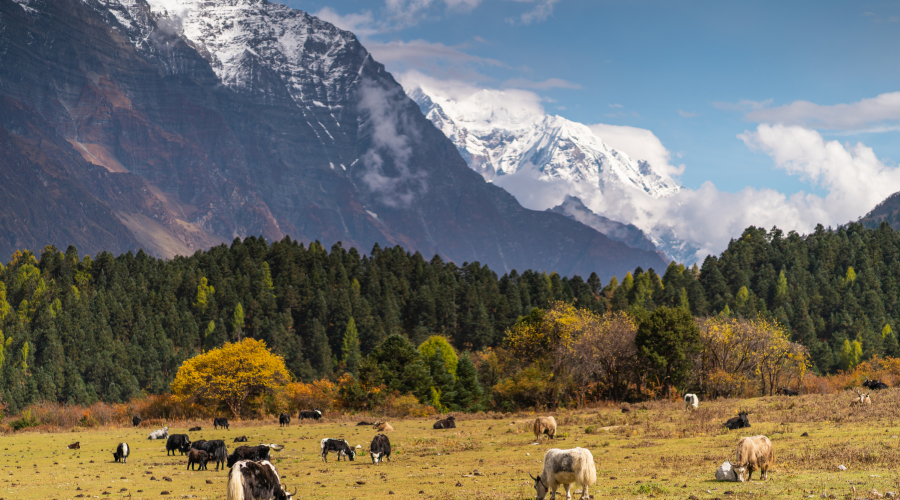
Photo: April's breathtaking scenery on the Manaslu Circuit Trail.
The temperature during April is between 2° to 10° Celsius. You should be aware that throughout April, the temperature decreases by 7° to 10° for every 1000 meters of elevation gain.
You need not to worry about the rain because April has hot and dry weather. Additionally, you won’t be exposed to the bitter cold of the winter. As a result, it will be considerably simpler for you to circle around Manaslu.
Manaslu Trek in May
Last but not least, May, the end of spring, is also a prime month for the Manaslu trek. The circuit will be less crowded than in the other months of the Spring season, and Late Rhododendron flower bloomers will still make the environment romantic.
The temperature during May is between 10° to 25° Celsius. You are set to experience a lot of sunshine during the day and even the nights are warmer. However, after you hit the 4000m elevation mark, the cold breeze of air will give you a heavenly feel.
Regardless, May can be considered a good month for people who are not fond of cold weather.
Pros of trekking in Spring
- Spring is the perfect season for the Manaslu circuit trek.
- The environment, weather, and climate are optimal.
- Wildflowers like Rhododendrons, lilies, and birds chirping make the route lively.
- Most of the tea houses are open for business, and food choices are ample.
Cons of trekking in spring
- The route will be comparatively more crowded.
- Cloud formation can block the view at lower elevations.
- You will feel hot and sweaty because of the warmer climate.
- The dry climate will result in dusty roads.
Manaslu Trek in Autumn
September, October and November make up the Autumn season. Depending upon your choice, Autumn can also be optimal if you prefer a lesser temperature than Spring.
Unlike any other Himalayan trip, the moderately difficult Manaslu Circuit Trek in the Autumn season offers unmatched mountain views, isolated Buddhist settlements on the Tibetan border, and cultural and geographic diversity.
One can experience clear weather, mild temperatures, rain-free days, and comfortable hikes in Autumn. This season is ideal as everything is refreshed, renewed, and vibrant.
Additionally, during this time of year, you may see the magnificently decked-out environment and snow-capped mountains.
Autumn is the festive season in Nepal. You will get a chance to experience multi-ethnic culture in Nepal and participate in various festivals.
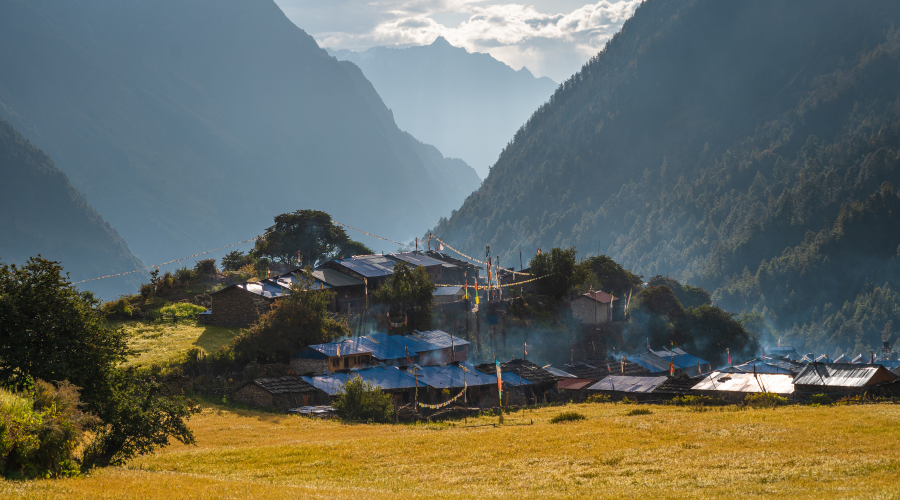
Photo: Lho Village on the Manaslu Circuit, framed by golden rice fields in autumn.
Manaslu Trek in September
September marks the start of the fall season, which marks the changeover from a wet monsoon to a steady autumn. In the lower region, you might experience the aftermath of monsoon season, while downpours in the upper region are quite rare.
Additionally, the temperature begins to drop in the morning and evening. The average temperature at higher elevations varies from 5°C to 10°C.
Manaslu Trek in October
Most of the time, the Circuit’s lower region gets a pleasant climate during October. The temperature drops to near freezing in the evenings and early mornings above 4000 meters.
In general, the Manaslu Circuit’s weather in October is excellent for trekking.
The month of October is referred to as the post-monsoon season. October will be perfect if you want to eliminate the chance of experiencing the aftermath of the monsoon. However, it is always preferable to have rain gear on hand to steer clear of unpleasant situations.
Manaslu Trek in November
In the Manaslu region, November signifies the end of autumn and the beginning of winter.
When sunlight hits the snow-capped mountain, the mountain will shine bright like a diamond, and it will be a treat for your eyes. The chance of cloud formation is low, resulting in a crystal clear view of the mountain range.
Moreover, the temperature can be a bit low, and individuals who don’t fancy a cold climate might have issues. However, the trek is doable with warm clothing and decent trekking gear.
Pros of trekking in Autumn
- Given that you prefer colder yet bearable temperatures, Autumn is the right choice for you.
- Chances of rainfall are pretty low as this season is post-monsoon.
- Major festivals like Dashain and Tihar fall in Autumn, which will make the trek lively.
- The sky is clear with little to no trace of clouds.
Cons of trekking in Autumn
- This season is not an ideal option if you cannot withstand colder climates.
- September might experience some drizzles because it directly follows the monsoon.
- Businesses might be slow during the festival days.
- The traffic of internal tourists increases as people of Nepal travel before/after festivals.
Manaslu Trek in Winter
December, January, and February make up the Winter season in Nepal. This season is not recommended because the temperature is not ideal.
However, if you like to push yourself and like challenges, you can consider trekking in this season. Additionally, picking this season can be fitting if you cannot manage time during the recommended seasons. The Snow makes the Manaslu Circuit trip more challenging in the winter.
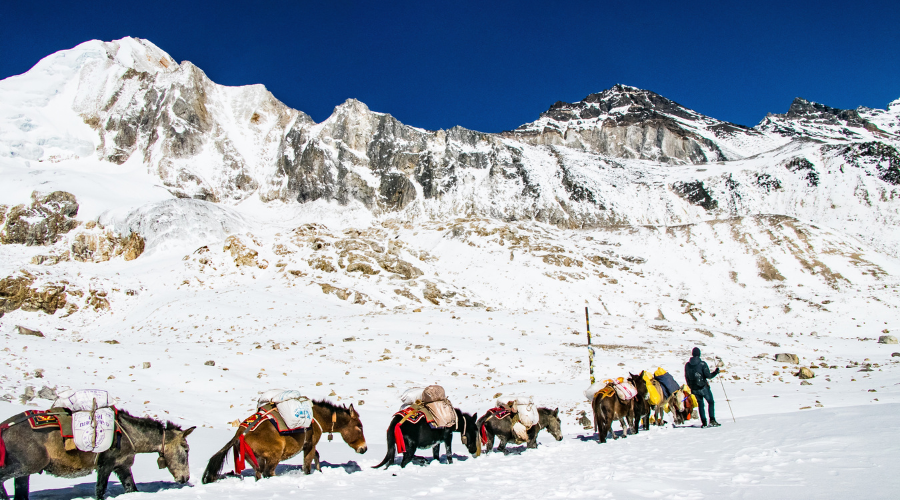
Photo: Winter scene of donkeys carrying supplies up the snowy slopes of Larke Pass in the Manaslu Circuit.
Manaslu Trek in December
The high-altitude region experiences severe cold and frequent snowfalls. Snowfall varies from a moderate to heavy level, which can make the journey more thrilling. Heavy snowfall is risky and can make the journey more treacherous. The temperature can be as low as -7°C.
During the trek, you should have a trekking pole with you and put on proper trekking boots. The temperature in the lower elevations is bearable during December, but as the elevation increases, the weather can test you thoroughly.
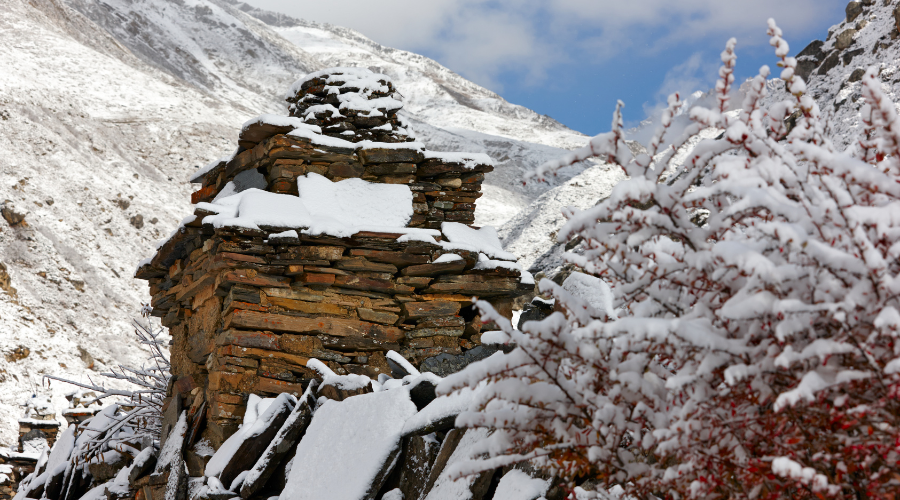
Photo: Manaslu Trail during December
Manaslu Trek in January
In terms of climate, “ the worst trekking month” award goes to January because the temperature.
in January can go below -12°C. You can expect heavy snowfall, little visibility, snowstorms, and slippery paths.
Teahouses and shops are mostly closed as the winter season is considered off-season. However, there will be little to no people in January, and you will pretty much have the trail all to yourself.
Manaslu Trek in February
February is also considered a bad idea to trek Manaslu because of the climate. However, if you want to experience a peaceful environment, you can opt for February. The temperature in February is around -10°C which will make you freeze right to your bones.
Similar to January, most of the businesses will be closed.
Pros of trekking in Winter
- There will be little to no crowd in Winter.
- If you enjoy snowfall and pushing yourself, winter is the best one.
- If you can’t wait for ideal seasons, you can go for the winter season.
- Provided that some shops are open, booking accommodation will be easy.
Cons of trekking in Winter
- Less visibility, slippery trails, and continuous snowfall will slow you down and test you mentally and physically.
- Most of the shops will be closed and fewer food options are available.
- You must have prior trekking experience during snowfall or go through intense training.
- In case of an emergency, getting help will be tough.
Manaslu Trek in Monsoon
June, July, and August make up the Monsoon season in Nepal. Although the monsoon season is not the best season to trek the Manaslu circuit, there are still several advantages. This season is optimal if you love walking in the rain and enjoy the sound of rain when it hits your raincoat.
Even Though it’s monsoon, it’s not certain that you will experience downpours throughout the journey. Moreover, the circuit will be less crowded and you can enjoy a peaceful journey.
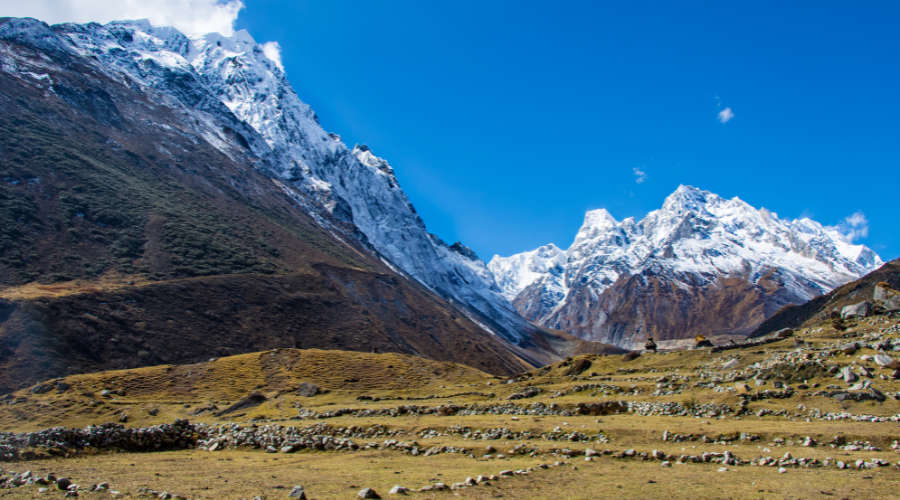
Photo:Clear skies over the Manaslu region during the rainy season.
Manaslu Trek in June
In June, the lower area temperature ranges from 16°C to 30°C. The higher region’s temperature remains between -3°C and -4°C. Since it is the rainy season, the trails are slick and muddy. You might have to deal with leeches and there is a risk of landslides.
On the positive side, certain wildflowers bloom in June, which can mesmerize the route.
Manaslu Trek in July
The month of July receives the most rain each year. The region is a little colder as a result of the rain, with temperatures ranging from 9°C to 14°C. The wind from the Bay of Bengal causes constant rain in July and the monsoon season. And when it rains, clouds gather and obstruct the view of the mountains. Leeches and mosquitoes can negatively impact your experience.
Manaslu Trek in August
August, the final month of the monsoon, is similar to that of July. The rain keeps falling from the sky onto the earth, making the environment chilly and damp.
The general temperature is consistent with the latter month of July. Additionally, the temperature rises, rising between 16°C and 24°C. Compared to July, one can experience less leeches and mosquitoes in August.
Pros of trekking in Monsoon
- If you are romantic and love rain, the Monsoon can be a good time for the Manaslu trek.
- There will be fewer traffic during this time of the year.
- The environment is clean and tidy with no chance of dust.
- Businesses will continue to serve despite Monsoon being an off-season.
Cons of trekking in Monsoon
- You should expect low to moderate rainfall during the journey. Rainfall will decrease the temperature to some extent.
- Leeches and mosquitoes can give you a hard time.
- The route can be muddy and slippery.
- Clouds can block the magnificent view of Manaslu and its surroundings.
- Additional investment is needed as raincoats, and waterproof outfits are required.
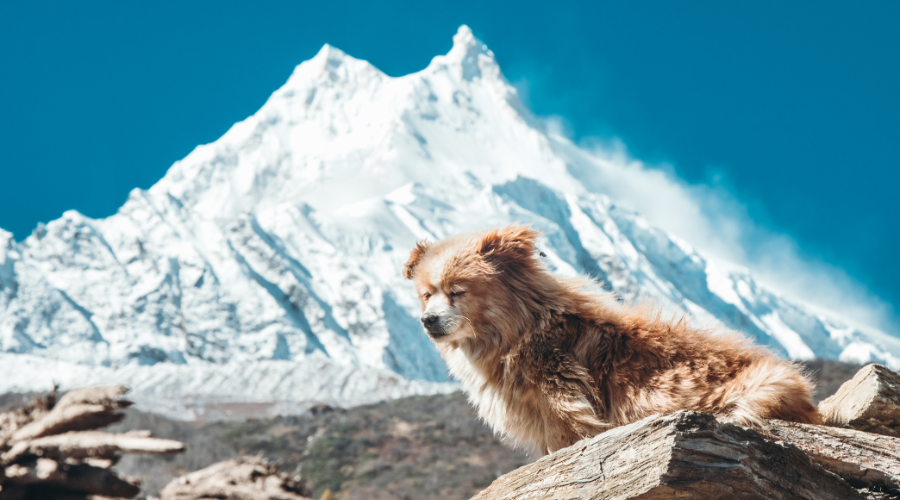
Some Tips
The breathtaking views you see throughout the Manaslu circuit will awestruck you. For making the trek easy, below are a few tips that will definitely contribute to the smooth completion of your journey.
Be a minimalist packer
Always remember that you are trekking and will have to carry your own weight(in case you don’t hire a potter). Every step you take will exhaust you as your oxygen level decreases when elevation increases. Make a list of essential supplies that are much needed throughout the journey. Ideally, your backpack should weigh less than 12 kg, while potters can carry around 25 kg. Below is a list of must-have supplies during the Manaslu circuit trek.
Clothing and Footwear
Pack outfits according to the season you are attempting the trek on. Always make sure that your clothing is warm, waterproof, and airproof. Moreover, invest good money in trekking shoes because wet, damp feet can pose problems on a lengthy hike that may even require turning back.
Altitude sickness meds and First aid kits
Acetazolamide, aka Diamox, is used to treat altitude sickness, and having first aid kits in your arsenal will definitely be useful in emergency cases.
Hard cash
Make sure you carry enough hard cash as you will pay for items using cash. ATMs are not available in remote areas, and the only mode of payment will be paper money.
Passport and Visa
Don’t forget to pack your visa and passport, as they will come in handy during an inspection. You will need four permits – Manaslu restricted area permit, the Manaslu conservation area permit, the Annapurna conservation area permit, and Tsum Valley permit.
Energy bars and favourite snacks
Packing energy bars and favorite snacks is a terrific pull when your stamina and spirits are down. You can buy snacks during the expedition but might have difficulty finding the preferred one.
Moreover, your list of supplies should include sunscreen lotions, goggles, a couple of water bottles, trekking poles, tech gadgets, battery backup, and toiletries.
Book your trek from a reliable trekking company
Always do a thorough research before you book a trek. A lot of travel companies in Nepal offer the service for cheap but the quality will definitely be poor.
Train yourself
A multi-day walk or climbing expedition requires careful planning. So, if you’re seeking a shortcut to avoid the difficult job of preparation, you might want to rethink. Your training should include cardio, legwork, uphill running, walking with weight, and endurance training. On top of the above-mentioned training, you can also stack your own set of preferred training routines.
Stay hydrated
Water is responsible for maintaining temperature, digestion, and smooth functioning of our organs. Moreover, water also plays a crucial role in eliminating the chance of altitude sickness. Dehydration can lead to dizziness and fatigue, which will only slow you down.
Consider the season you plan to trek on
Spring and Autumn are the ideal seasons to trek in Nepal, including the Manaslu circuit trek. If you cannot withstand rain and snow, always opt for spring and autumn as they offer multiple advantages over winter and monsoon.
Move at your own pace
Trekking is not a race; everyone has their own pace. You have to know your limits, the distance of the trek(177 kms/110 miles), age, stamina and experience. Don’t compare your speed with that of others. Instead, go slowly and take a rest. It takes time to adjust to the low oxygen levels, so pay attention to your body and let yourself acclimatize properly.
Plan well ahead and book earlier
Start planning 6 months prior and book as soon as possible. Manaslu welcomes high volumes of visitors during the peak seasons. So, in order to make sure you can complete the journey in the desired season, booking earlier is a wise choice.
FAQs
The breathtaking 19 days(23 days from Kathmandu) Manaslu Circuit trip circumnavigates the eighth-highest peak on the planet. It starts in the lively market village of Soti Khola, travels up, and ends in Besisahar.
It depends upon the services provided by your agency. On average, the Manaslu circuit trek costs between US$900 and US$2200.
The trail itself is very old and follows an ancient Tibet-Nepal salt trading road along the Budi Gandaki river. Trekking route in Manaslu was first opened in 1992. However, it is a restricted trekking route, and special permits are required as the Manaslu conservation area is a part of the trek.
The Manaslu circuit trek can be categorized as moderate, but if you want your adventure to go smoothly, you must have some prior trekking expertise or regular training.
Yes, a guide is mandatory. Manaslu comes under the Manaslu conservation area project (MCAP), and the area between Jagat and Bhimtang is confined. According to the government of Nepal, a minimum of one licensed individual, either a professional guide with a license or a porter guide, must be hired from a local trekking service.
The Manaslu circuit trek can be considered a bit harder than the Annapurna circuit trek. Although the distance to cover the Annapurna circuit is more, the trails of the Manaslu trek are tougher. Moreover, Manaslu is a restricted area, you are not allowed to wander freely without a licensed guide.
Conclusion
In summary, the best seasons for the Manaslu trek are spring and autumn. These seasons are best suited for individuals who prefer moderate climates and less challenging environments.
However, if time is of the essence and you want to trek during the off-seasons, monsoons and winter can also be considered. If you are willing to take risks and challenge the mountains, you will be tested thoroughly during these seasons.
NEWSLETTER SIGNUP
Sign up to receive our trip ideas and travel offers!
Get updates and Exclusive Offers up to 20% Discount




